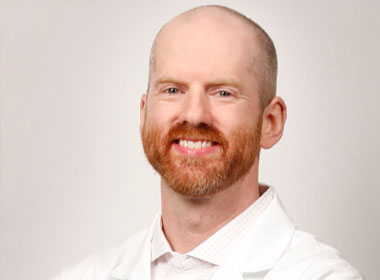Dr. Adam Smith Focuses on Recovery Time and Reducing Pain
As published in March/April 2019 issue of ArkansasMedicalNews.com

Adam Smith, MD, an orthopedic surgeon with OrthoArkansas from 2017 to the present, was following in a family tradition when he went into medicine. His father, Bruce Smith, MD, was an orthopedic surgeon in Hot Springs, his grandfather, James Marsh, MD, was a general practitioner in Warren, and his uncle, Wallis Marsh, MD, is a liver transplant surgeon. His mother, Cindy Smith, and aunt, Kathy Nasworthy, are nurses. And his brother, P. Allan Smith, MD, is also an orthopedic surgeon practicing at OrthoArkansas, the largest orthopedic group in Arkansas.
"I became interested in medicine at an early age," Adam Smith said. "I liked the surgeries. And I really love giving people a better quality of life through joint replacement."
Smith's subspecialty focus is the reconstruction of the hip and knee.
"By only focusing on one or two areas, in my case hip and knee replacement, that is all I do, all day, every day," said Smith, who completed a fellowship in adult reconstruction (hip and knee replacement and revision) at the Mississippi Sports Medicine and Orthopedic Center in Jackson, Miss., from 2016-2017. "Not only do I not have to focus on things that are not necessarily my specialty, neither does my nurse or surgical team. Instead, we can focus on providing the best joint replacement and revision joint replacement experience to our patients."
The goal of his practice is to provide expert treatment of the hip and knee with the use of arthroscopy, partial (unicompartmental) and total knee replacement, total hip replacement, mini-incision hip replacement, realignment procedures (avoiding joint replacement), and revision hip and knee replacements (when the prosthesis has failed).
One constant effort is working to get patients' pain under better control and get them recovered and home faster. Patients after hip and knee replacement are typically spending, at most, one night in the hospital, before being discharged to the comfort of their own homes.
"Patients do much better at home versus going to a skilled nursing facility or a rehab facility," Smith said. "There is also a lower risk of infection by going home. Patients with knee replacements are going to outpatient physical therapy 2-3 times a week and no longer using continuous passive motion machines (CPMs) as those have been found to have no effect. Patients with hip replacement are using a walker for 7-10 days and are weaned from the walker as soon as that can be tolerated. Also, deep vein thrombosis (DVT) prophylaxis has changed from historically using coumadin, which had to be carefully monitored, to aspirin in most cases."
There has been interest in recent years in using stem cell therapy as an alternative to surgery. But Smith hasn't seen any studies proving stem cell injections actually regrow cartilage.
"From what I have read, it can help control pain, but it is no better or worse than steroid injections," Smith said. "I'm not doing it because it hasn't been proven to show a benefit overall. Stem cell transplants are very expensive and a lot of insurance companies don't cover them. In addition to not being proven, it is a high out-of-pocket expense. It is still being researched. It might depend on how much cartilage damage there is. People who have arthritis to the point of needing knee replacement probably would not benefit from this procedure."
It is common for people to delay a hip or knee replacement because of fear of surgery or the recovery time involved. Smith said patients need to decide about replacement based on how much pain they are in and how much relief they are getting with conservative treatment.
"If they aren't getting relief and it is affecting their quality of life, then it is probably time to do something more," Smith said.
Born and raised in Hot Springs, Smith attended Lakeside K-12 and then did his undergraduate work at the University of Arkansas in Fayetteville. He completed medical school at the University of Arkansas for Medical Sciences. His residency was at University of Mississippi Department of Orthopedic Surgery. While in residency, Smith participated in an AO International Fellowship in Switzerland.
His hobbies include cycling, hunting, watching the Razorbacks and skiing.
